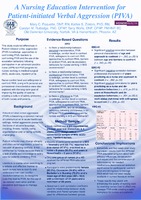Speaking up or remaining silent: Understanding the influences on nurses when patients are at risk
View File(s)
- Author(s)
- Details
-
Jennifer Boice Rainer, PhD, MBA, RN, CPHQ, CPHRM, NEA-BC
- Sigma Affiliation
- Non-member
Visitor Statistics
Visits vs Downloads
Visitors - World Map
Top Visiting Countries
| Country | Visits |
|---|
Top Visiting Cities
| City | Visits |
|---|
Visits (last 6 months)
Downloads (last 6 months)
Popular Works for Rainer, Jennifer Boice by View
| Title | Page Views |
|---|
Popular Works for Rainer, Jennifer Boice by Download
| Title | Downloads |
|---|
View Citations
Citations
Objective: The purpose of this study was to understand speaking up behavior among RNs.
Background: Speaking up is the use of one’s voice to share information or alert those in authority of one's concerns about patients, and is primarily influenced by organizational culture, personal culture, and workforce generation. Failure to speak up can lead to moral distress; speaking up can lead to moral courage.
Methods: A cross-sectional electronic survey was distributed to several thousand RNs resulting in 303 surveys providing usable data.
Results: We found that organizational culture was a strong predictor of speaking-up behaviors, and that speaking up partially mediated the relationship between organizational culture and moral distress, but not between organizational culture and moral courage. Workforce generation or personal culture did not explain nurses using their voice (U=3217, z=1.54, p=.124, r=.12).
Conclusions: The strong role of organizational culture supports the efforts toward healthy work environments. Because not speaking up is related to moral distress, efforts must be escalated to ensure nurses are empowered to use their voices.
| Type | Dissertation |
| Acquisition | Proxy-submission |
| Review Type | None: Degree-based Submission |
| Format | Text-based Document |
| Evidence Level | Cross-Sectional |
| Research Approach | Quantitative Research |
| Keywords | Patient Safety; Patient Advocacy; Organizational Culture; Medical Errors; Verbalizing Concerns |
| Grantor | Saint Louis University |
| Advisor | Schneider, Joanne K.; Lorenz, Rebecca |
| Level | PhD |
| Year | 2019 |
All rights reserved by the author(s) and/or publisher(s) listed in this item record unless relinquished in whole or part by a rights notation or a Creative Commons License present in this item record.
All permission requests should be directed accordingly and not to the Sigma Repository.
All submitting authors or publishers have affirmed that when using material in their work where they do not own copyright, they have obtained permission of the copyright holder prior to submission and the rights holder has been acknowledged as necessary.
Related items
Showing items related by title, author, creator and subjects.
-
Verbal de-escalation program for nurse self-efficacy when caring for violent patients and family members
Jubb, Julia MasonEscalation of violence is an issue in health care. Nurses need to be safe in clinical practice. Violence is a problem at the local, state, and federal level. In this presentation, the author reviews violence in health care, ... -
Verbal de-escalation for nurse and health care worker improved self-efficacy when caring for violent patients
Jubb, Julia Mason (2017-03-03)Session presented on Friday, March 17, 2017: Nurses and health care workers are being harmed by violent patients and family members and need to be safe in practice (The Joint Commission, 2010). Based on data from the ... -
Supporting nurses to speak up for patient safety using an employee engagement survey
Hall, Nicole J.; Graf, Cheryl (2017-06-14)Purpose: The purpose of this research study is to further develop the understanding of factors that influence patient safety as they relate to nurses speaking up when faced with concerns through examination of archival ... -
A nursing educational intervention for patient-initiated verbal aggression
Poquette, Mary C.; Rutledge, Carolyn; Wolfe, Tarry (2017-07-03)Problem: Patient-initiated verbal aggression (PIVA) has become an all too common occurrence (Park, Cho, & Hong, 2015) in hospitals, requiring skills other than therapeutic communication techniques taught in traditional ... -
The lived experience of making a medication administration error in nursing practice
Lall, Seema (2018-03-23)Participants will appreciate the importance of nurses' responsibility in medication administration process, and the accountability towards patients (first victim) and self (second victim)in terms of error/s occurrences. ...





